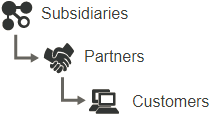

The following is a list of statewide object categories (groups) which are valid for each account type: The next segment of the Account contains the Statewide Object.

The following is a list of account subtypes which are valid for each account type: Account SubtypeĪccount subtype indicates financial and budgetary reporting requirements. Thus Account types 7, 8, 0, and 5 are the progression of an expenditure from the budget, to the purchase order stage, to a payable encumbrance and finally to an actual expenditure. Account types "0" and "5" transactions are recorded in the General Ledger. When the check is produced, the "Account type 0" (AP encumbrance) is liquidated and the actual expenditure, "Account type 5" is recorded. Account types "8" and "0" transactions are recorded in the General Ledger. If a purchase order has been previously entered for this invoice, an accounting rule liquidates the "Account type 8" purchase order encumbrance and records an "Account type 0" (AP encumbrance). When the invoice is entered or displayed in the accounts payable module, an "Account type 5" is associated with the transaction amount.

To establish a budget for an expenditure, an "Account type 5" is entered into the North Carolina Accounting System through the Budgetary Control module. "Account type 7" (Budgeted Expenditure), "Account type 8" (PO Encumbrance), "Account type 0" (AP Encumbrance) and "Account type 5" (Actual Expenditure) represent the stages of an expenditure or expense in North Carolina Accounting System. The following description explains this concept: Life Cycle of an Expenditure System accounting rules in the Financial Controller (FC) module change an account type from its original entry type to its posted account type. The following is a list of account types with their normal balance and processing class, which are valid for Account position 1: #įor data entry purposes, only account types beginning with 1 through 5 are used.
#Www atttvnow accounts overview software
The processing class is built within the software to indicate the accounting treatment of account types at year- end. Through the use of the different account types, the general ledger provides both budgetary and accrual GAAP reporting. The first position of the Account is the account type, which describes the major category of an account. They are reserved for future use of further detail and are not currently required. The last seven positions are also left blank. For non-grant accounting functions, positions 10 and 11 are blank. Positions 10 and 11 are reserved for a grant fiscal year indicator (where year 1991 becomes 91). The first nine positions represent the North Carolina Accounting System account numbers. Fiscal Year (Grant Accounting Only) (Positions 10-11).The North Carolina Accounting System account is identified as follows:Īccount is divided into five identifiers: Eleven positions of the account are currently being used for the North Carolina Accounting System. It describes the purpose of an expenditure, the type of revenues received, and the balance sheet accounts required for GAAP accounting. The Account is the next segment in the Chart of Accounts.


 0 kommentar(er)
0 kommentar(er)
